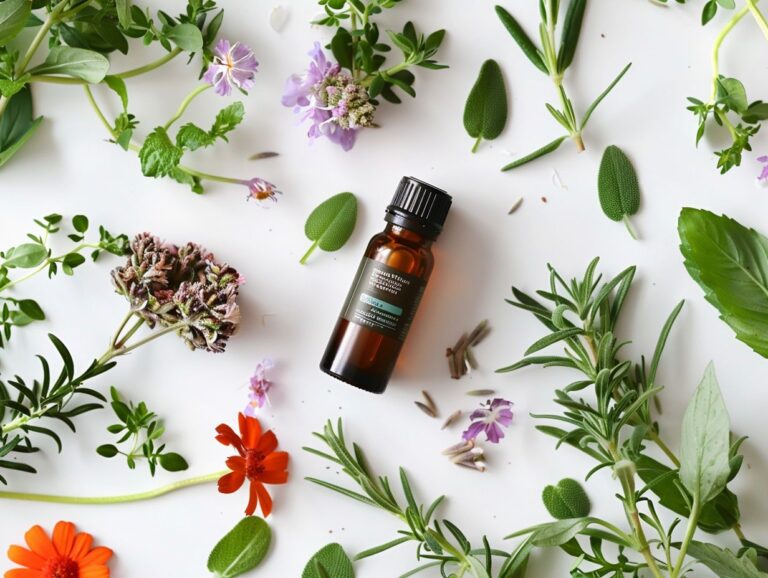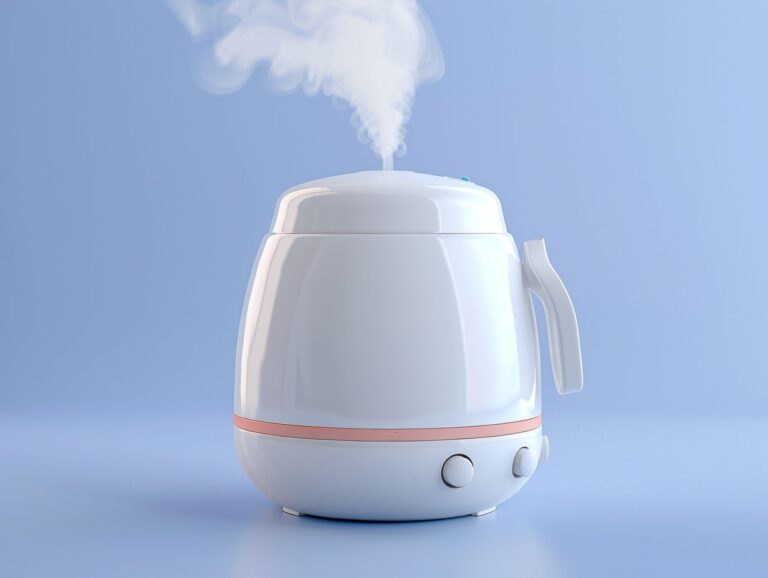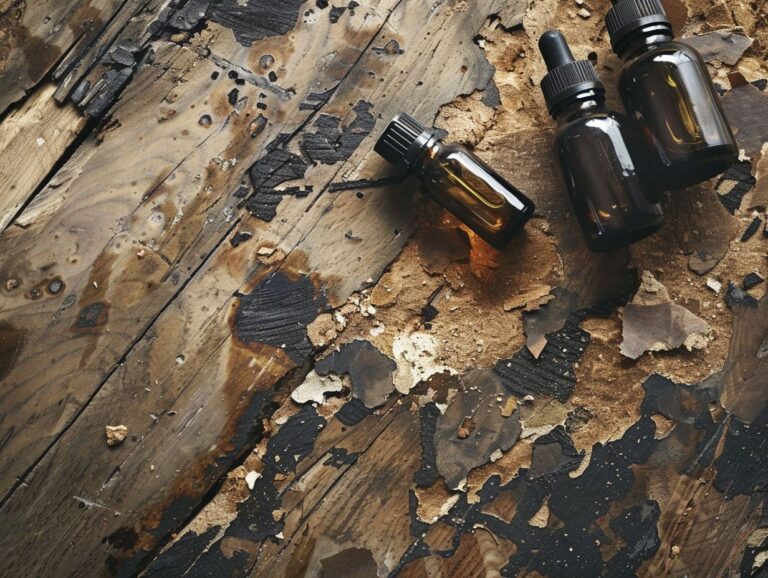What to Do With Expired Essential Oils
Interested in learning more about essential oils and their expiration dates?
We will explore the shelf life of essential oils, what happens when they expire, how to tell if they have gone bad, and uses for old essential oils.
From using them for aromatherapy to beauty products, we will cover all the ways you can still make use of expired essential oils.
Find out the best way to dispose of expired oils and whether they can be recycled or thrown in the trash.
Key Takeaways:
What Are Essential Oils?
Essential oils are concentrated extracts derived from plants that carry the natural aroma and therapeutic properties of the source plant. They are commonly used in aromatherapy and as natural remedies due to their diverse chemical composition and potential health benefits.
These oils are extracted through various methods such as steam distillation, cold pressing, or solvent extraction, ensuring that the beneficial compounds are preserved in their purest form. Their benefits range from promoting relaxation and reducing anxiety to aiding in digestion and boosting immunity. For example, eucalyptus essential oil is known for its decongestant properties, making it beneficial for respiratory issues, while rose essential oil is revered for its skin rejuvenating properties and mood-enhancing effects.
What Is the Expiration Date of Essential Oils?
Understanding the expiration date of essential oils is crucial for maintaining their quality and efficacy.
Essential oils, being highly concentrated plant extracts, can lose their potency over time if not stored correctly.
Proper storage conditions play a vital role in extending the shelf life of essential oils, such as storing them in dark glass bottles away from direct sunlight and heat sources.
Factors like exposure to air, light, and heat can accelerate the oxidation process of essential oils, leading to a decrease in their therapeutic properties.
Adhering to safe storage practices ensures that essential oils retain their aromatic and healing benefits for a longer period.
How Long Do Essential Oils Last?
The shelf life of essential oils varies depending on the type of oil, its chemical composition, and the presence of carrier oils. Proper storage in a cool, dark place is essential for extending the longevity of these oils.
Essential oils with higher concentrations of monoterpenes, such as citrus oils, lavender, and eucalyptus, tend to have shorter shelf lives. On the other hand, oils rich in sesquiterpenes like patchouli and sandalwood have longer shelf lives.
Carrier oils play a crucial role in determining the shelf life of essential oils. They dilute the potent essential oils, reducing oxidation and extending their usability. Popular carrier oils like jojoba, coconut, and sweet almond oil can enhance the stability and shelf life of essential oils.
Factors such as exposure to air, heat, and light can accelerate the deterioration of essential oils. Storing them in dark glass bottles, away from sunlight and heat sources, can prevent oxidation and preserve their aroma and effectiveness for longer periods.
What Happens When Essential Oils Expire?
Expired essential oils may undergo significant changes in their chemical composition, leading to adverse reactions such as skin irritation or reduced potency. Using expired oils can result in unpleasant odors or a cloudy appearance.
The color of the oil may darken, indicating oxidation and degradation of its properties. The once-clear consistency might become thicker or develop sediment, making it unsuitable for use in aromatherapy or massage. The aroma of expired essential oils can also turn rancid or musty, affecting the overall experience and efficacy. These alterations not only compromise the intended benefits of the oil but also pose a risk of adverse skin reactions and potential allergic responses.
Do Essential Oils Lose Their Scent When Expired?

As essential oils age, exposure to light, heat, and air can break down the molecular structure, altering the balance of compounds responsible for their fragrance. For example, citrus oils like lemon and orange are particularly susceptible to oxidation, leading to a decline in their fresh and uplifting scent. Similarly, floral oils such as rose and jasmine can lose their delicate notes when they go past their prime.
Therefore, proper storage in dark glass bottles, away from heat sources, can help prolong the shelf life and preserve the olfactory qualities of these precious oils.
Do Expired Essential Oils Become Harmful?
Using expired essential oils can pose risks to health and safety, as they may cause adverse effects on the skin or respiratory system. Prioritizing safety is essential when dealing with expired oils.
Expired essential oils can lose their therapeutic properties and may even become rancid, leading to skin irritation, allergic reactions, or respiratory distress. The chemical composition of expired oils can change, resulting in a higher likelihood of adverse reactions.
It is crucial to understand that expired essential oils may no longer offer the intended benefits and could potentially harm rather than heal. Therefore, safety should always come first when it comes to handling, storing, and using essential oils, especially when they have exceeded their shelf life.
How to Tell If Essential Oils Have Expired?
Identifying expired essential oils involves observing changes in color, noting inconsistencies in labeling, and assessing any alterations in their therapeutic benefits. Recognizing these signs is crucial for safe usage.
In terms of changes in color, discoloration or cloudiness may indicate that the essential oil has oxidized and lost its potency. In terms of labeling, check for any faded or worn-out information, as well as discrepancies between the label details and the actual aroma of the oil. Be wary of any changes in the scent or effectiveness of the oil, as expired oils may not deliver the expected benefits. Ensuring the authenticity and quality of essential oils is not only about efficacy but also about safety for your well-being.
What Are the Signs of Expired Essential Oils?
Expired essential oils may exhibit signs such as changes in color, consistency, or aroma due to improper storage or prolonged shelf lives. Understanding these indicators is key to identifying expired oils.
Color changes can range from darkening, cloudiness, or separation of layers. Consistency may become thicker, thinner, or develop sediment. Aroma alterations can include a rancid smell or a loss of the original scent. Oils stored in sunlight or high temperatures are more prone to deterioration. Extended shelf lives without proper sealing can also lead to oxidation and degradation. Always check the expiry date, if available, and perform a sensory assessment before using any essential oil.
What Can You Do with Expired Essential Oils?
While expired essential oils are not suitable for aromatherapy or direct skin application, they can still be repurposed for non-cosmetic uses like cleaning or crafting. Leveraging their remaining therapeutic benefits in alternative ways is a sustainable approach.
Expired essential oils that are past their prime can find new life in various household tasks. For example, a few drops of lemon oil can be added to a DIY all-purpose cleaner for a fresh scent and antibacterial properties. Similarly, lavender oil can be diffused with water to create a calming room spray. In crafting, expired oils can be incorporated into homemade candles or potpourri for a touch of natural fragrance. It’s all about thinking outside the box and maximizing the utility of these oils in unexpected ways.
Can Expired Essential Oils Be Used for Aromatherapy?

When essential oils reach their expiration date, they start to lose their potency and effectiveness. This can result in unpredictable outcomes when used for aromatherapy, diminishing the desired benefits and possibly causing harm to the skin.
Quality should always be a top priority when selecting essential oils for therapeutic purposes, as using subpar or expired oils can compromise the safety and efficacy of the treatment. It is crucial to adhere to expiry dates and proper storage guidelines to ensure that your essential oils maintain their integrity and provide the intended therapeutic effects.
Can Expired Essential Oils Be Used for Cleaning?
Expired essential oils can be repurposed for cleaning purposes when combined with baking soda to create natural cleaning solutions. Their lingering aroma can help combat unpleasant odors effectively.
When using expired essential oils for cleaning, you can mix them with baking soda to form a paste ideal for scrubbing sinks, tiles, and countertops. This mixture not only cleans surfaces but also leaves a fresh scent due to the essential oils. For a multipurpose cleaner, mix equal parts of vinegar, water, and expired essential oil in a spray bottle. This solution can be used to sanitize and deodorize surfaces such as kitchen counters, bathroom fixtures, and doorknobs.
Can Expired Essential Oils Be Used for Beauty Products?
While using expired essential oils in beauty products is not recommended due to changes like a cloudy appearance, they can sometimes be incorporated into diluted formulations for limited applications. Caution is advised to prevent skin irritation.
Expired essential oils may lose their beneficial properties and could potentially harbor contaminants, which may lead to skin sensitivities or adverse reactions upon application. The risk of skin irritation increases when expired oils are used undiluted or in high concentrations, making it crucial to dilute them properly for safer use.
When repurposing expired essential oils, opt for carrier oils like jojoba or coconut oil to dilute them. A general guideline is to use approximately 1-2% of the expired oil in the carrier oil before applying it to the skin. It is essential to perform a patch test before full application to monitor any adverse reactions.
How to Properly Dispose of Expired Essential Oils?
When disposing of expired essential oils, it is important to consider safety and environmental impact. Proper storage and containment are crucial to prevent accidental exposure and preserve any remaining therapeutic benefits.
To ensure safe disposal, first, check with your local waste management guidelines. Many municipal recycling facilities accept essential oils, usually as hazardous waste. Fully secure the bottle to avoid leaks or spills during transportation. If the oil is not accepted by the facilities, mix it with a neutralizing agent, such as cat litter or sawdust, before sealing it in a container. Remember, do not pour essential oils down the drain or dispose of them in the regular garbage as they can harm the environment.
Can Expired Essential Oils Be Recycled?
Expired essential oils can be recycled by safely emptying them into an appropriate container and cleaning the original essential oil bottle for reuse. Care should be taken to avoid skin irritation or exposure during the recycling process.
After ensuring the bottles are empty, it’s crucial to properly label the container where the oils have been emptied to avoid any confusion.
- When cleaning the original essential oil bottles, use warm, soapy water to remove any residue or aroma.
- Rinse thoroughly and let them air dry completely before reuse.
Remember to research local guidelines for hazardous waste disposal to ensure that the oils are being disposed of in an environmentally friendly manner. Repurposing these bottles not only reduces waste but also contributes to a sustainable lifestyle.
Can Expired Essential Oils Be Thrown in the Trash?

It is crucial to prioritize proper containment when discarding expired essential oils to avoid any potential harm. Not only does this protect your health and well-being, but it also safeguards the environment from contamination. By sealing the oils in leak-proof containers or packaging , you create a barrier that reduces the risk of accidental exposure and prevents the substances from seeping out.
Taking the time to secure the oils in sealed containers ensures that they do not come into contact with other waste materials, minimizing the chances of chemical reactions or harmful interactions. This mindful approach to disposal is not only a matter of personal safety but also a responsible step towards environmental protection.
Frequently Asked Questions
What can I do with expired essential oils?
Expired essential oils can still have some benefits, but they may not be as potent as fresh oils. You can use them for cleaning, making DIY beauty products, or diffusing for a subtle scent.
How can I use expired essential oils for cleaning?
You can add a few drops of expired essential oil to your cleaning solution to give it a fresh scent and boost its cleaning power. Some oils, like lemon or tea tree, are also known for their antibacterial and antiseptic properties, making them great for cleaning.
Can I use expired essential oils on my skin?
It is not recommended to use expired essential oils on your skin, as they may cause irritation or have reduced therapeutic effects. It’s best to stick to using fresh oils for topical use.
How can I make DIY beauty products with expired essential oils?
Expired essential oils can still be used in DIY beauty products, such as homemade body scrubs, bath salts, or face masks. However, keep in mind that the potency of the oil may not be as strong as before, so you may need to use a larger amount.
Is it safe to diffuse expired essential oils?
Diffusing expired essential oils is generally safe, as long as the oil has not gone rancid. However, the scent may not be as strong or long-lasting as fresh oils. It’s best to use them in a diffuser blend with other oils to create a unique scent.
How can I tell if my essential oil has expired?
Essential oils do not have an expiration date, but they can go bad over time. If the oil has a strange odor or is discolored, it may have gone rancid and should not be used. It’s always best to store your oils in a cool, dark place to prolong their shelf life.








One Comment